Essentially, feel-good legislation is ineffective, but quite profitable.
Anti-gun control arguments are in no short supply. From the historical tradition of firearms in America to the threat of violent crime, there’s something for everyone on this side of the aisle. Let’s discuss some of the more compelling anti-gun control arguments happening today.
Report Highlights:
- The Supreme Court consistently rules that U.S. citizens have a right to keep and bear arms.
- Madison, Hancock, and Washington all support the need for a well-regulated and disciplined militia.
- Homicide rates in the U.S. reached new highs after sweeping Federal gun control acts.
- The gun control and gun rights industry is a multi-million dollar industry that has little impact on firearm-related deaths.
- 64% of Americans think that firearms make homes safer despite firearm-related deaths.
- 56% of Americans supported stricter gun control in 2023 as opposed to 78% in 1990.
- 12% of Americans supported relaxed gun control in 2023 compared to only 2% in 1990.
Second Amendment Arguments Against Gun Control
There’s much debate about the original intent of a fairly straightforward statement; “A well-regulated militia, being necessary to a free state, the right of the people to keep and bear arms shall not be infringed.”
Plainly put, some Americans place credence on the first part of the sentence, and others only on the second part. However, after reading several founding documents, letters, and Supreme Court cases, it’s obvious: the first statement explains why the 2A is necessary, and the second limits the government’s power over the right to keep and bear arms.
Supreme Court Cases
The Supreme Court consistently upholds that U.S. citizens have the right to keep and bear arms. However, the Second Amendment does not apply to all firearms and all individuals.
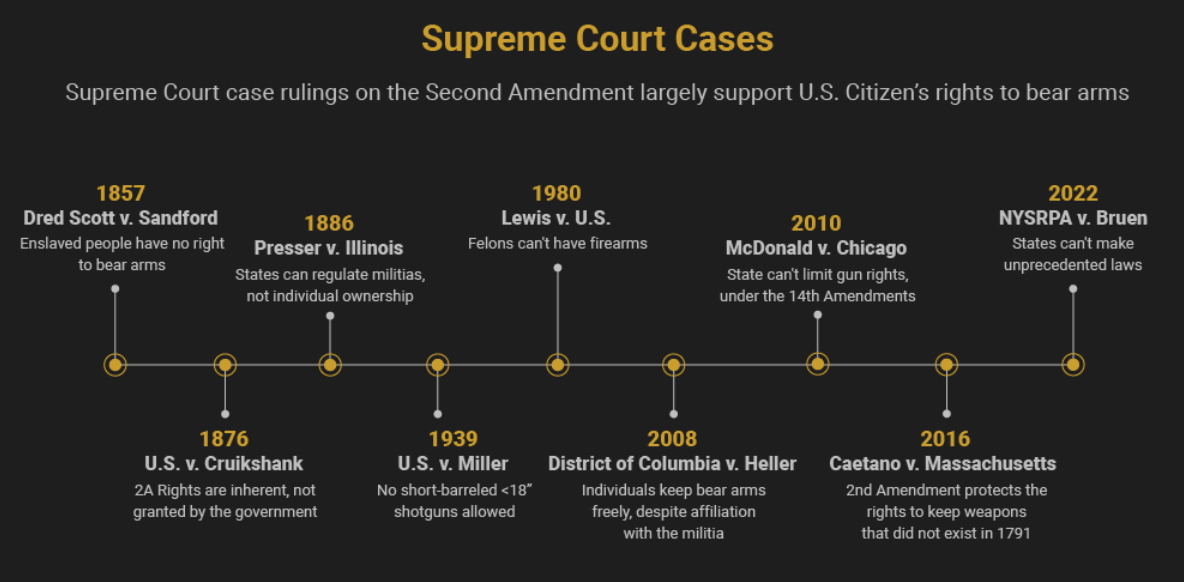
Exploring a Well-Regulated Militia
Rather than arguing semantics or sentence structure, let’s review a few founding documents written before the Constitutional Convention.
John Hancock’s Boston Massacre Oration 1774
In John Hancock’s speech on the anniversary of the Boston Massacre, we see that the well-regulated militia is comprised of the citizens of states and not controlled by the government.
A well-disciplined militia is a safe, an honorable guard to a community like this, whose inhabitants are by nature brave, and are laudably tenacious of that freedom in which they were born. From a well-regulated militia we have nothing to fear; their interest is the same with that of the State. When a country is invaded, the militia are ready to appear in its defense; they march into the field with that fortitude which a consciousness of the justice of their cause inspires; they do not jeopard their lives for a master who considers them only as the instruments of his ambition, and whom they regard only as the daily dispenser of the scanty pittance of bread and water. No; they fight for their houses, their lands, for their wives, their children; for all who claim the tenderest names, and are held dearest in their hearts; they fight pro aris et focis, for their liberty, and for themselves, and for their God.
George Washington to John Hancock 1776
George Washington expressed to John Hancock that an unregulated and undisciplined militia would not adequately protect the colonies from foreign threats.
“– added to a consciousness of my inability to govern an Army composed of such discordant parts, and under such a variety of intricate and perplexing circumstances, induces not only a belief, but a thorough conviction in my Mind, that it will be impossible unless there is a thorough change in our Military System for me to conduct matters in such a manner as to give Satisfaction to the Publick, which is all the recompense I aim at, or ever wished for.”
Exploring the Right of the People
James Madison – Federalist Paper #46
James Madison wrote Federalist Paper #46 in 1788. One of his many contributions to the Constitutional Convention (and, ultimately the Constitution) was that the right of the people to keep and bear arms would greatly benefit the States’ liberty.
Besides the advantage of being armed, which the Americans possess over the people of almost every other nation, the existence of subordinate governments, to which the people are attached, and by which the militia officers are appointed, forms a barrier against the enterprises of ambition, more insurmountable than any which a simple government of any form can admit of – James Madison Federalist Paper 46
When we put these pieces together, we can see the founders intent: that a well-regulated militia would be necessary to maintain a free state, and therefore, the right of the people to keep and bear arms shall not be infringed.
Ethical Arguments Against Gun Control
The gun control debate isn’t only trending headlines and state house rallies, it’s also a multi-million dollar industry.
As evidenced by years of data (shown below), gun control is largely unsuccessful. In fact, the United States has had federal gun control legislation since 1934. Yet, homicide rates have increased 26% since this time.
Furthermore, there is no correlation between firearm-related deaths (including homicide, suicide, unintentional, and law enforcement) and gun lobbying (for or against gun control).
Essentially, feel-good legislation is ineffective, but quite profitable.
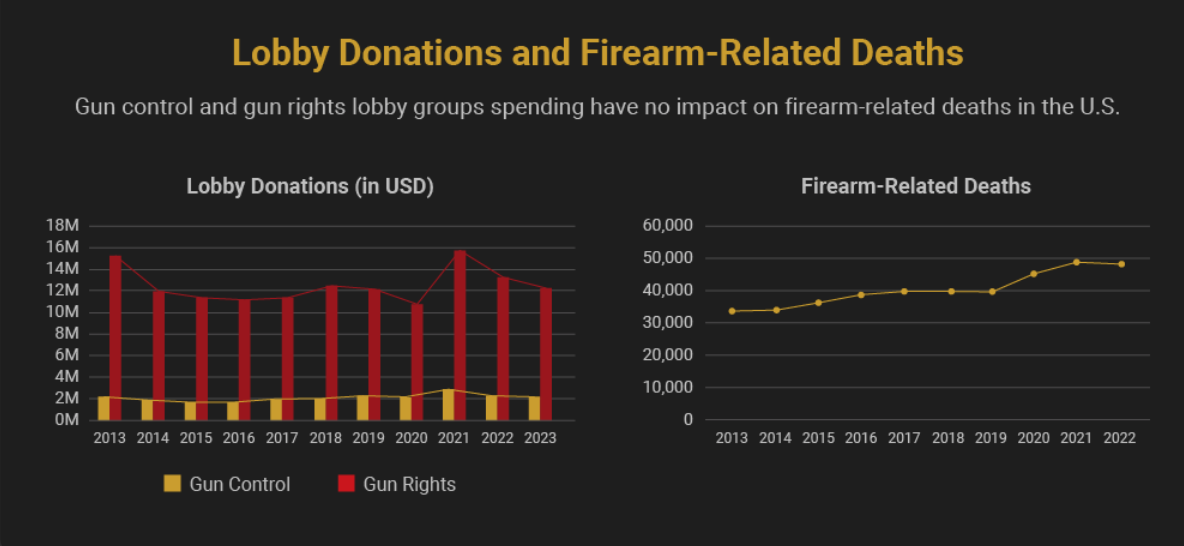
Why We Don’t Need Gun Control
Gun control legislation only serves to disarm those who choose to comply. Per the Supreme Court, even if an officer of the law is present, they have no duty to protect civilians. Coupled with the fact that violent crime and homicide rates continue to climb, the best defense afforded to American citizens is the ability to adequately protect themselves.
- In 2022, 477,053 violent crime victimizations occurred within a residence. 203,165 occurred on a street, highway, alley, or sidewalk.
- 370,118 of the 647,523 violent crimes reported in 2022 were assailants unknown.
- 4,271 women, 18,192 men, and 2,402 children were murdered in 2022 (all methods).
Arguments for Gun Control in the U.S.
The gun control debate dates back to prohibition in the United States. After alcohol was prohibited, crime rates increased due to a new market for underground liquor. As rates climbed, the federal government reacted with the NFA.
In 1934, the NFA (National Firearms Act) added a $200 tax stamp to certain firearms, making them less appealing. However, gun violence continued to rise. In 1968, after the assassination of JFK and Dr. Martin Luther King Jr., the federal government passed more gun control.
Today, the argument is still ongoing – “If there were no guns, there’d be no gun deaths.”
It’s a simple and seemingly logical statement. So, let’s dive in.
How Many People Die from Guns Each Year?
Basic logic dictates that more guns equals more shootings. Naturally, you can’t shoot someone if you don’t have a firearm. However, this simple understanding of firearms in the U.S. misses critical points.
First, firearm confiscation is not possible in the U.S. for numerous reasons. Second, the data shows that when firearm restrictions prevent lawful gun owners from purchasing or carrying firearms, overall homicide rates increase.
Here are the stats:
- The national homicide rate before the 1968 Gun Control Act was 5.3.
- The decade following the act had an average national homicide rate of 8.9.
- The decade following the 1986 Gun Owners Protection Act saw an average national homicide rate of 8.69 (this included the decade with the 1990 School Zone Safety Act, 1993 Brady Act, and 1994 FAWB).
- The decade following the expiration of the FAWB saw national homicide rates drop to 5.07.
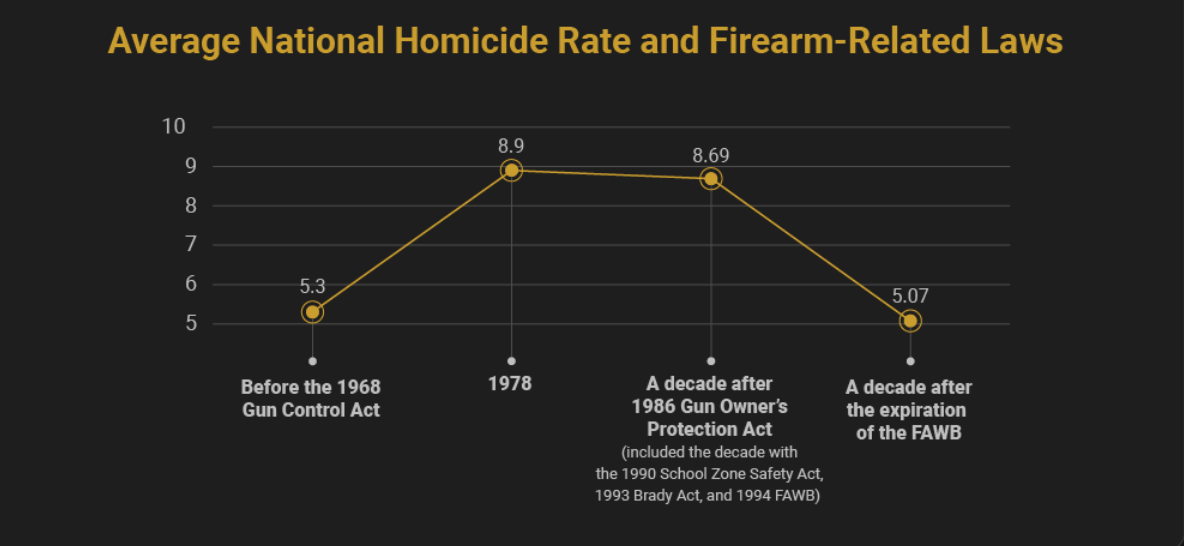
Are Mass Shootings on the Rise in States with Loose Gun Control Laws?
We’re only one month into 2024, and already there have been a few mass shootings. It seems the U.S. is continuing the same pattern as 2023 regarding violence. Of course, another trend we seem to carry over each year is that mass shootings occur in many states.
Despite gun laws and restrictions, the top ten states for mass shootings contain a variety of the strictest gun law states and some with more relaxed firearm legislation.
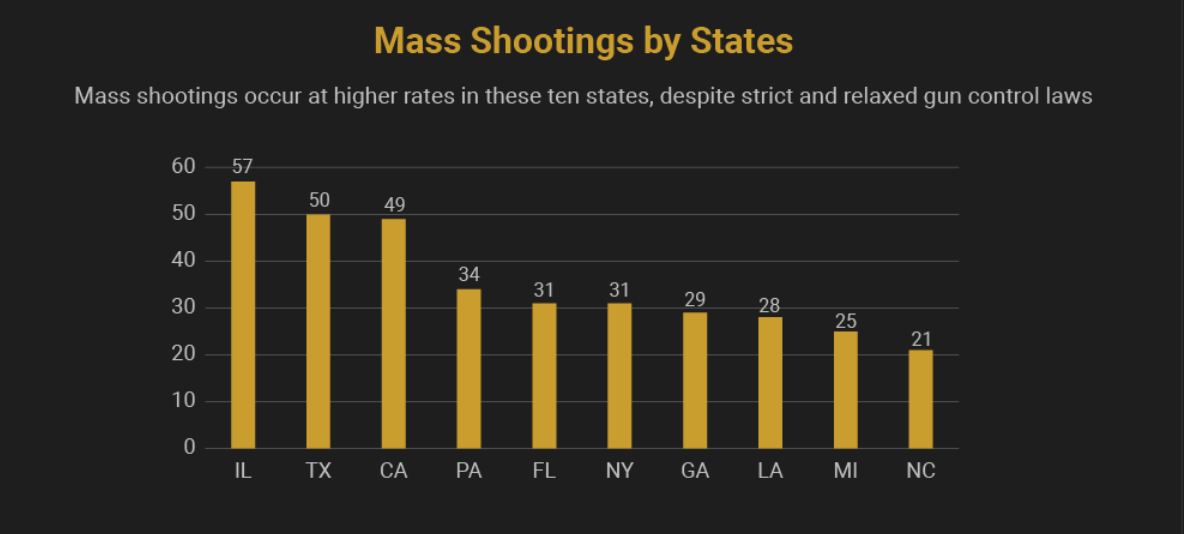
Over Half of Americans Support Gun Control
A commonly cited statistic from pro-gun control advocates is that over half of Americans support gun control. While the obvious retort is that Americans’ rights can’t be voted away (thanks to our founders), we can still look at these stats to determine how gun control support aligns with homicide rates in the U.S.
Fewer Americans supported gun control in 2023 than they did in 1990. Furthermore, violent crime rates were lower in 2023 than in 1990.
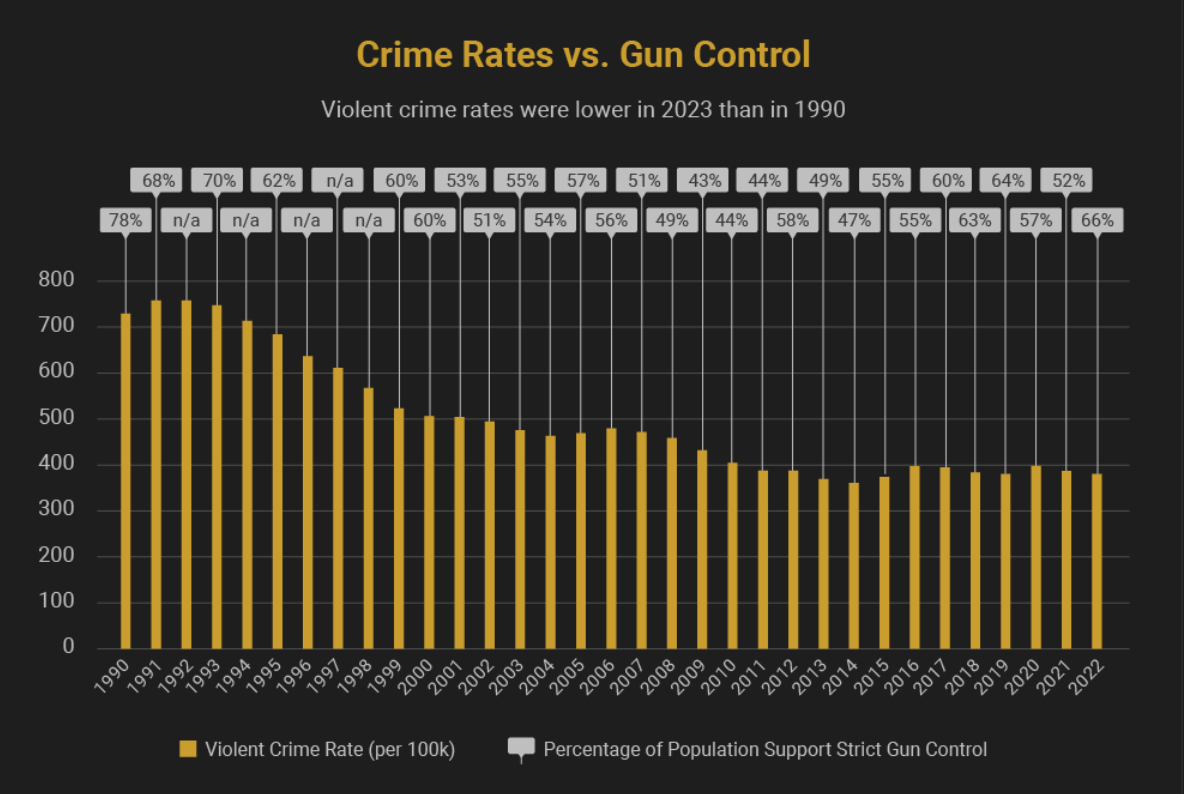
Sources:
- Mass Shooting by State 2013-2019
- Gallup Polls 1990-2023
- ATF Rules FFL
- Gun Rights Lobby Donations
- 2022 Homicide Statistics
- FBI Violent Crime Data
LegalReader thanks our friends at Ammo.com for permission to republish this study. The original is found here.

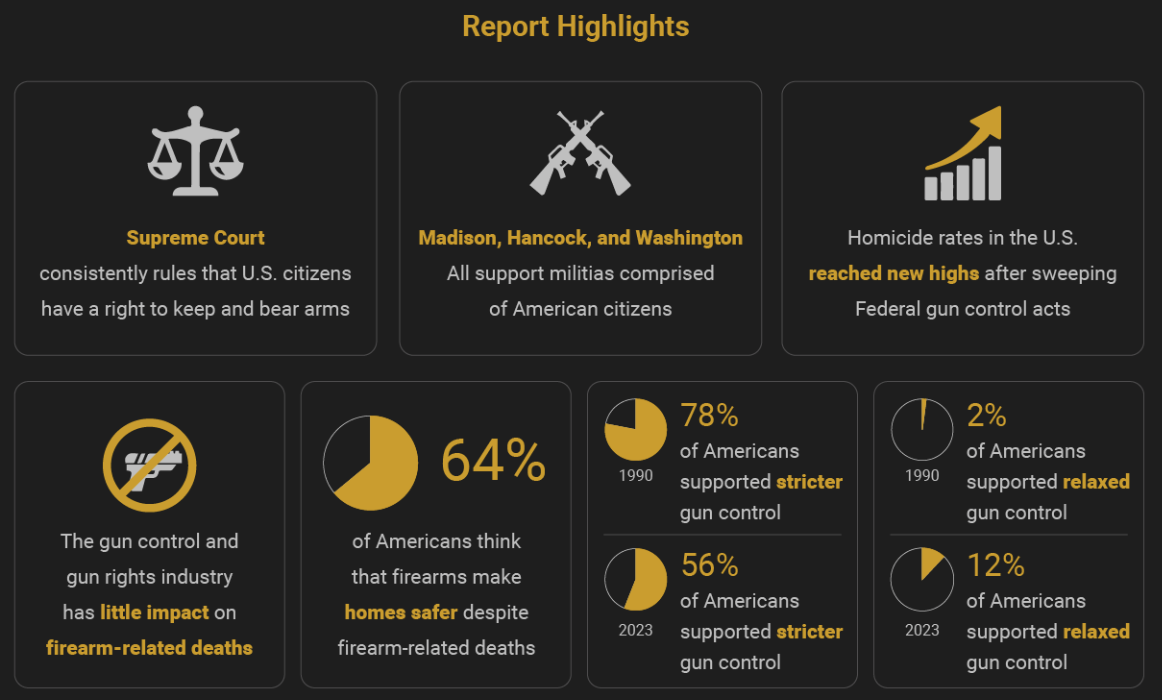
Join the conversation!